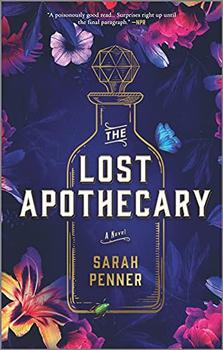Summary | Excerpt | Reading Guide | Reviews | Beyond the Book | Readalikes | Genres & Themes | Author Bio

A Novel
by Sarah Penner1
Nella
February 3, 1791
She would come at daybreak—the woman whose letter I held in my hands, the woman whose name I did not yet know.
I knew neither her age nor where she lived. I did not know her rank in society nor the dark things of which she dreamed when night fell. She could be a victim or a transgressor. A new wife or a vengeful widow. A nursemaid or a courtesan.
But despite all that I did not know, I understood this: the woman knew exactly who she wanted dead.
I lifted the blush-colored paper, illuminated by the dying flame of a single rush wick candle. I ran my fingers over the ink of her words, imagining what despair brought the woman to seek out someone like me. Not just an apothecary, but a murderer. A master of disguise.
Her request was simple and straightforward. For my mistress's husband, with his breakfast. Daybreak, 4 Feb. At once, I drew to mind a middle-aged housemaid, called to do the bidding of her mistress. And with an instinct perfected over the last two decades, I knew immediately the remedy most suited to this request: a chicken egg laced with nux vomica.
The preparation would take mere minutes; the poison was within reach. But for a reason yet unknown to me, something about the letter left me unsettled. It was not the subtle, woodsy odor of the parchment or the way the lower left corner curled forward slightly, as though once damp with tears. Instead, the disquiet brewed inside of me. An intuitive understanding that something must be avoided.
But what unwritten warning could reside on a single sheet of parchment, shrouded beneath pen strokes? None at all, I assured myself; this letter was no omen. My troubling thoughts were merely the result of my fatigue—the hour was late—and the persistent discomfort in my joints.
I drew my attention to my calfskin register on the table in front of me. My precious register was a record of life and death; an inventory of the many women who sought potions from here, the darkest of apothecary shops.
In the front pages of my register, the ink was soft, written with a lighter hand, void of grief and resistance. These faded, worn entries belonged to my mother. This apothecary shop for women's maladies, situated at 3 Back Alley, was hers long before it was mine.
On occasion I read her entries—23 Mar 1767, Mrs. R. Ranford, Yarrow Milfoil 15 dr. 3x—and the words evoked memories of her: the way her hair fell against the back of her neck as she ground the yarrow stem with the pestle, or the taut, papery skin of her hand as she plucked seeds from the flower's head. But my mother had not disguised her shop behind a false wall, and she had not slipped her remedies into vessels of dark red wine. She'd had no need to hide. The tinctures she dispensed were meant only for good: soothing the raw, tender parts of a new mother, or bringing menses upon a barren wife. Thus, she filled her register pages with the most benign of herbal remedies. They would raise no suspicion.
On my register pages, I wrote things such as nettle and hyssop and amaranth, yes, but also remedies more sinister: nightshade and hellebore and arsenic. Beneath the ink strokes of my register hid betrayal, anguish…and dark secrets.
Secrets about the vigorous young man who suffered an ailing heart on the eve of his wedding, or how it came to pass that a healthy new father fell victim to a sudden fever. My register laid it all bare: these were not weak hearts and fevers at all, but thorn apple juice and nightshade slipped into wines and pies by cunning women whose names now stained my register.
Oh, but if only the register told my own secret, the truth about how this all began. For I had documented every victim in these pages, all but one: Frederick. The sharp, black lines of his name defaced only my sullen heart, my scarred womb.
Excerpted from The Lost Apothecary by Sarah Penner. Copyright © 2021 by Sarah Penner. Excerpted by permission of Prospect Park Books. All rights reserved. No part of this excerpt may be reproduced or reprinted without permission in writing from the publisher.
Your guide toexceptional books
BookBrowse seeks out and recommends the best in contemporary fiction and nonfiction—books that not only engage and entertain but also deepen our understanding of ourselves and the world around us.